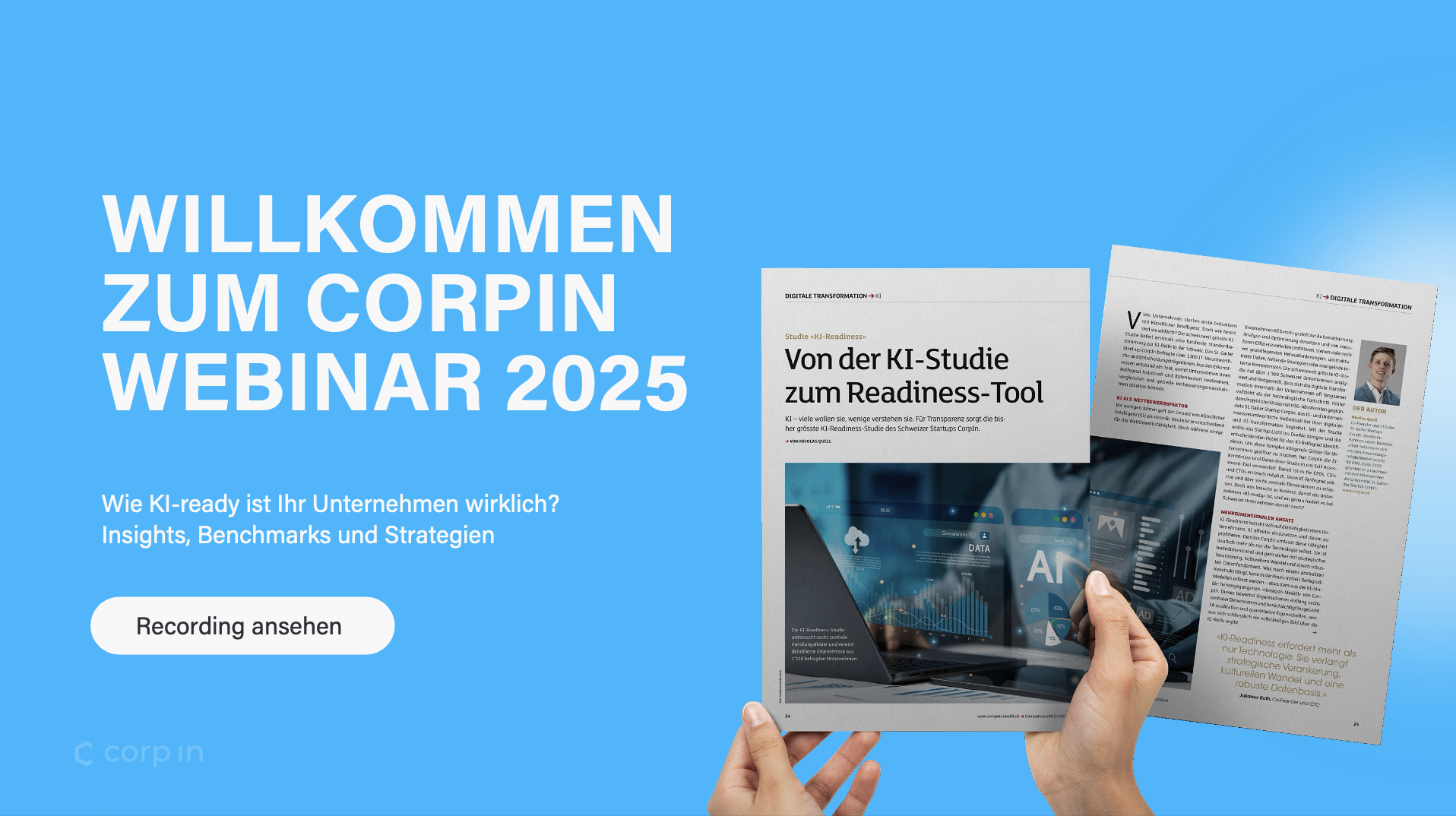Artificial intelligence in marketing: revolution instead of hype for companies in Switzerland

Authored by

May 23, 2025
Data x creativity = impact
Artificial intelligence (AI) is currently causing a stir in the world of marketing - some LinkedIn newsfeeds seem to consist of over 80% AI topics. But how much substance is behind the trend? Is AI in marketing just a brief hype or a real revolution? "We overestimate the short-term developments and underestimate the long-term developments," says Prof. Marcus Schögel (University of St. Gallen) in a recent podcast interview. He makes it clear that AI is not a passing buzzword trend, but a long-term change with a profound strategic impact. Companies - especially SMEs in Switzerland - should therefore not dismiss AI as a gimmick, but proactively develop an AI strategy and invest in data-driven innovation.
If you want to delve deeper into the topic, you can listen to the first episode of our podcast "CorpInSight" with Markus Schögel - now! 🎙️ Listen now
AI is more than just hype: although we are currently experiencing an enormous peak in attention (driven by ChatGPT, for example), the topic is not new. Schögel reminds us that the discussion about AI is "much older" - early machine learning approaches or image recognition at Google's DeepMind bear witness to this. The term AI has a broad and sometimes vague definition.
The important thing is: According to the classic Gartner "hype cycle", hype is often followed by a cooling off - but with AI, the development seems so rapid ("exponential character") that waiting is risky. Companies can hardly afford to miss this innovative leap. Instead of panicking or sitting out the trend, they should ask themselves now: "Have we understood what we actually want to achieve with AI? Where can it help us? And how do we do it?". In other words, a clear AI vision and strategy are becoming a must - especially for companies in Switzerland that do not want to fall behind the international competition (AI Strategy Switzerland).
Data × Creativity = Impact: The formula for success in marketing
A key message from the conversation with Prof. Schögel is "Data × Creativity = Impact". The formula sums it up: AI achieves real impact, i.e. tangible added value, in marketing above all when data and creativity come together. Schögel emphasizes that data and creative ideas are not opposites, but multiply: "The important thing is... that this is a product: data times creativity.".
Why is this combination so crucial? Many marketing departments already have vast amounts of data and sophisticated analysis tools. At the same time, creative campaigns and content ideas are being developed. However, there is often a lack of interfaces to connect the two. Data alone leads to pure "interchangeability". Marketing that is only data-driven and lacks creative differentiation is unlikely to generate customer enthusiasm. Conversely, even brilliant creative ideas remain ineffective if they are not based on relevant data about target groups, timing or channels.
One example of the successful interplay of data expertise and creativity is provided by Swiss retailers: two years ago, Coop integrated data-based insights into the creative design of a Christmas campaign - with great success. Such cases show: When companies link their existing data resources with fresh ideas, genuine data-driven innovation emerges. However, Schögel sees this as the biggest challenge: many companies find it difficult to get the "combinatorics" right. His warning: it is important to understand "that data and creativity actually belong together" - only then will AI-based marketing really ignite and promote customer centricity with AI, i.e. customer-centric personalization and experiences based on data and creative sensitivity.
Challenges in the introduction of AI: silos, culture and integration
Despite all the promises, companies face tangible challenges if they want to use AI in marketing. Several pain points are clearly identified in the podcast:
Data silos and fragmented structures
Over 30% of companies struggle with very heterogeneous and isolated data structures, which is a major obstacle for AI projects. Without a uniform, accessible database, no AI initiative can really take hold. If customer data is spread across departments or "trapped" in old systems, digital transformation remains piecemeal. Schögel emphasizes: "If I don't have a data basis... the whole thing is useless." Companies should therefore first invest in their data infrastructure and break down silos.
Low awareness in management
Many managers still hardly use AI tools themselves. According to a McKinsey study cited above, only ~3% of managers surveyed spend a significant amount (>30% of their time) on generative AI, while top decision-makers believe it is less than 1%. This discrepancy shows: The top level often underestimates what is already possible and many are afraid of contact. Schögel sees this as the "most underestimated area" - managers need to gain experience themselves in order to be able to assess the potential of AI. Otherwise, the necessary awareness and vision to strategically anchor AI in the company will be lacking.
Lack of employee involvement
Technological transformation is always also change management. Often "employees are not involved. People think in silos," warns Schögel. If the workforce has no buy-in or is unsure how to deal with AI, the first projects fail. Employee acceptance can be achieved by offering training at an early stage, defining guidelines for the use of AI (e.g. handling data and tools) and creating space for joint brainstorming. The best AI use cases often come from the employees themselves if they are given the freedom to experiment and uncover inefficiencies. An open culture in which AI is seen as a tool rather than a threat is crucial.
"Employees are often not included. People think in silos."
These challenges are classic and comparable to previous technological leaps (internet, social media, mobile). Many of the reasons why initial AI projects stumble are similar to the reasons why other change projects fail: lack of awareness, insufficient support from the top, isolated thinking and no broad support within the company. However, it is precisely these stumbling blocks that can be cleared out of the way once they have been recognized - and the foundations for successful AI initiatives laid.
Practical use cases: From agentic AI to automation
Despite all the initial hurdles, there are already numerous use cases for how AI can create value in marketing and day-to-day business. The podcast discusses some of the areas of application that decision-makers should keep an eye on:
Agentic AI - autonomous AI agents
Agentic AI refers to AI systems that can act and make decisions independently. Modern tools now make it possible to create specialized AI agents via prompt engineering that proactively execute entire workflows. In marketing, for example, such agents could autonomously optimize campaigns or control personalized customer approaches in real time. This development ("agentech workflows") has the potential to drastically increase efficiency - and fundamentally change workflows. Companies should experiment with how digital assistants or bots can take over routine tasks.
AI-supported decision support
One particularly exciting field is decision support. Here, humans and machines work together collaboratively. For example, a marketing analyst can process complex data from an AI and receive suggestions as to which measures are most promising. "You carry out an analysis and let the machine suggest what you should do," says Schögel, describing the principle of decision support systems. AI provides data-supported recommendations (such as which price is optimal or which content works for which target group), which humans then check and implement. This makes decisions faster and more objective - without leaving human experience out of the equation.
Internal automation and efficiency
Last but not least, AI offers enormous potential for automating internal processes. From lead qualification and the creation of initial content drafts to the segmentation of customer lists, many repetitive tasks can be delegated to AI systems. This frees up employees to concentrate on strategic and creative tasks. Schögel advises companies to first look at "where do I have things that I can standardize?". Standardized routine processes in particular are the best candidates for AI and automation solutions. It is always important to find the right human-machine mix - AI should relieve employees, not replace them. When humans and AI work together effectively, "it moves mountains", says Schögel about the power of this collaboration.
These and other use cases show: AI offers a wide range of opportunities, from customer-oriented marketing to internal process optimization. It is crucial that companies remain open to experimentation - many companies are currently running more pilot projects than an airport has runways, as Schögel notes with a wink. You learn from every pilot project.
Recommendations for SMEs: start small, take a customer-focused approach
Small and medium-sized enterprises (SMEs) in particular often ask themselves how they should get started with AI. Prof. Schögel provides valuable recommendations that decision-makers can take to heart:
"Simply trying things out is the first thing - even if it's on a very small scale."
Start small and learn
Start with a manageable pilot project instead of wanting to turn everything upside down straight away. "Just trying things out is the first thing to do - even if it's on a small scale." These learning pilots provide experience with little risk. Accept initial failure as a learning effect - the important thing is that the team learns from it. Many small steps add up to big progress in the long run.
Select measurable use cases
Look for a project with a clear value proposition and KPIs that you can use to demonstrate the impact of AI. Ideally, the project should either have great efficiency potential, a high learning potential or a direct impact on growth or sales. Measurable results will help you convince internal stakeholders more quickly to make further investments. Concentrate on sub-areas that are easy to define and scale up gradually after success.
Use customer interfaces (customer centricity)
Choose use cases that are close to the customer. Schögel recommends always thinking about projects from the customer's perspective. Instead of just optimizing internal processes, consider where AI can directly improve the customer experience - be it in marketing (personalized approach), sales (better advice) or service (faster response times). In the past, digital transformations were often too inwardly focused and the customer was "not brought on board". Avoid this mistake by making customer centricity with AI your guiding principle. Projects at the customer interface not only bring quick benefits, but also help to generate internal enthusiasm for AI because they deliver tangible results.
Maintain database
Finally, it is worth taking a look at the database: make sure that at least basic data is available and accessible. Without data, there can be no AI success - "if there is no data basis, the whole thing is useless," warns Schögel. SMEs do not have to have perfectly organized data warehouses, but customer and market data in a usable form, for example, is a good starting point. If necessary, publicly available data or small in-house data collections can also be used to train initial models.
Conclusion
AI in marketing is here to stay. For decision-makers in Swiss companies, this means taking strategic action now. The key lies in combining technology, data and human creativity, learning step by step and taking the people in the company with you. Those who launch customer-focused AI initiatives today are laying the foundations for tomorrow - for greater efficiency, innovation and competitiveness in the digital future.
Listen to the podcast now
Curious for more first-hand insights? In the full podcast episode with Prof. Marcus Schögel, you will learn even more about successful AI strategies, concrete examples and practical tips. Listen in and benefit from the experience of a leading expert - it's worth it!
The content of this article may have been improved with the help of artificial intelligence. Therefore, we cannot guarantee that all information is complete and error-free.




